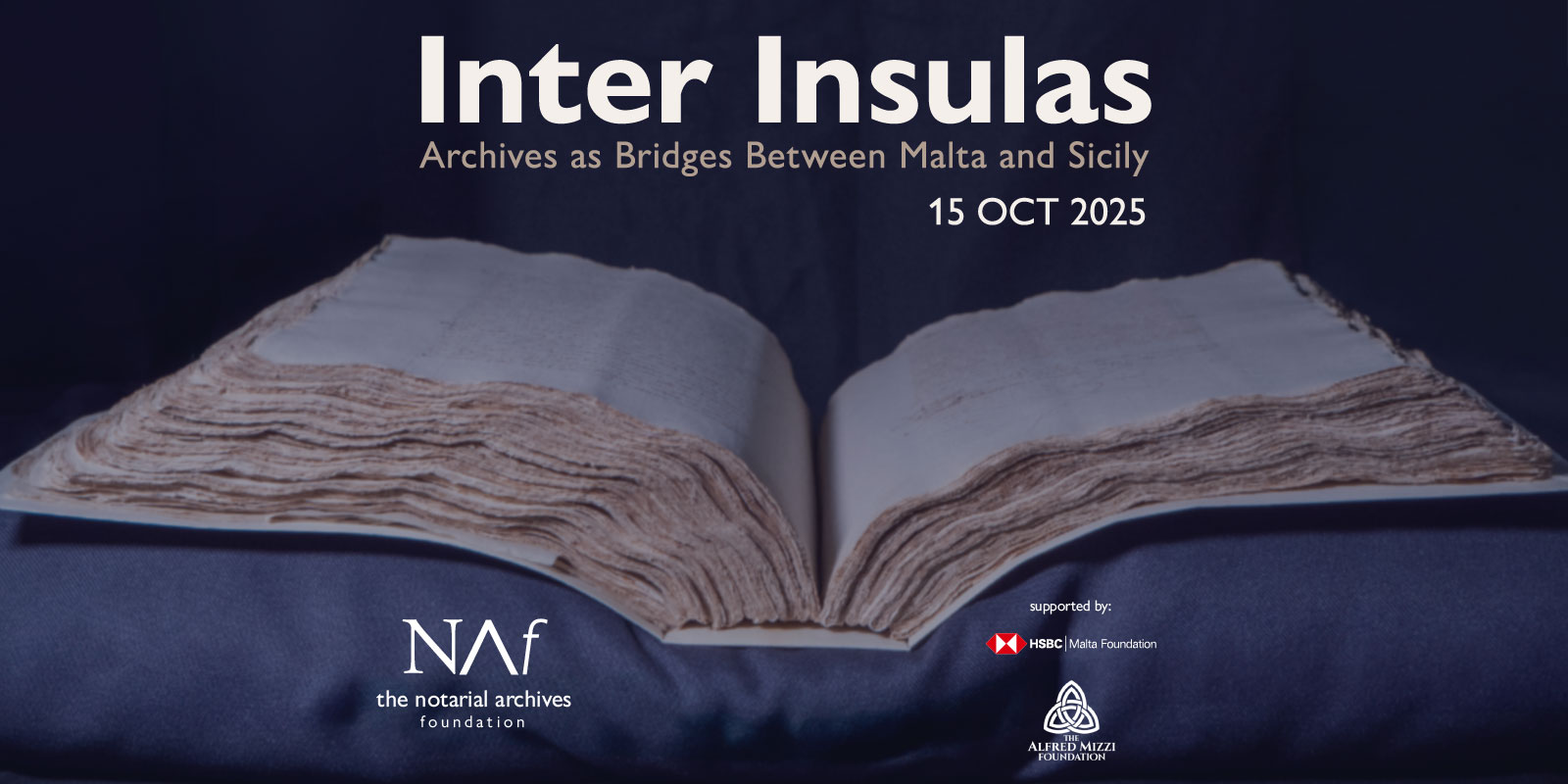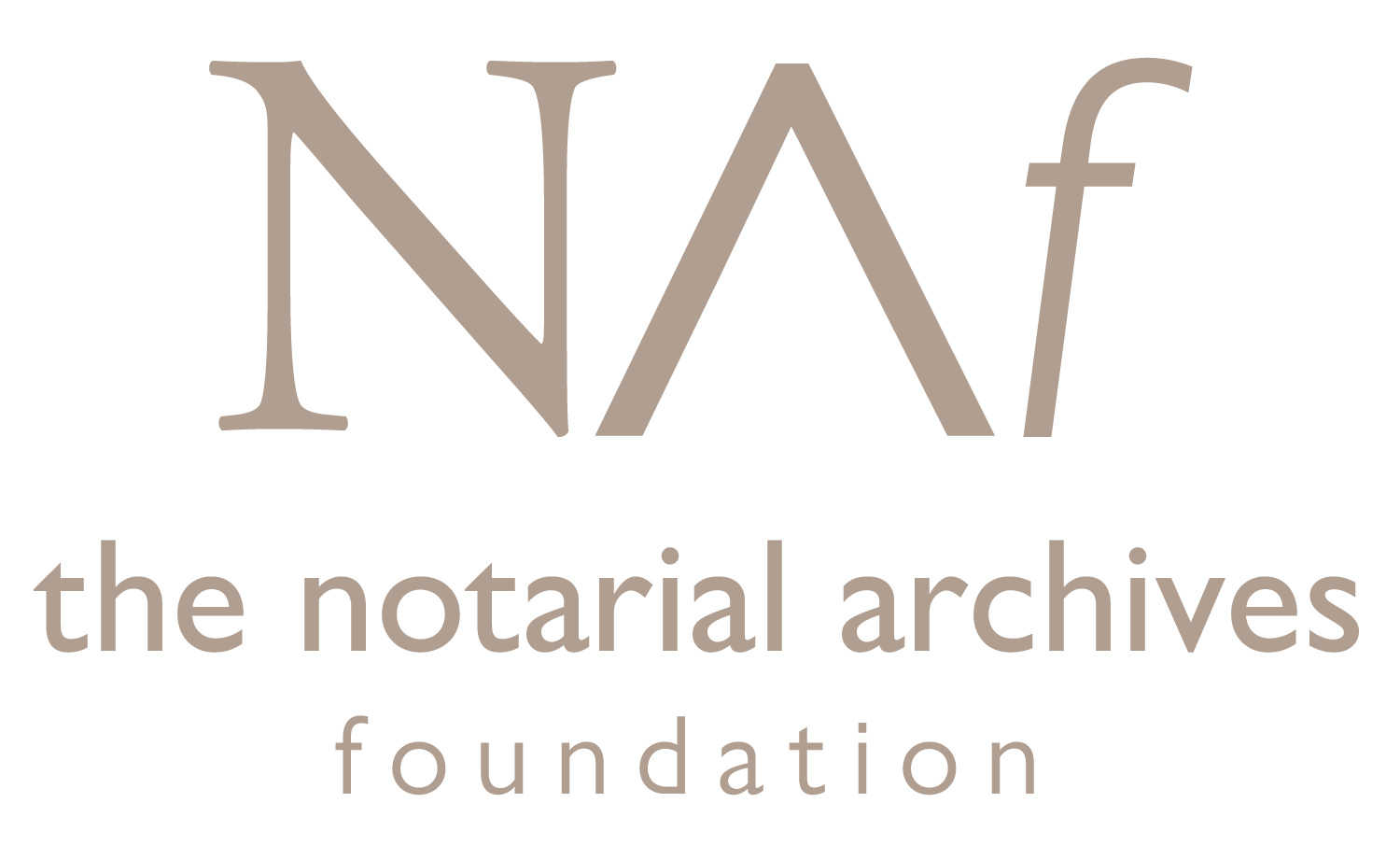
Inter Insulas: Archives as Bridges Between Malta and Sicily

Overview
The Notarial Archives Foundation is proud to announce the upcoming Malta-Sicily archival symposium.
Title: Inter Insulas: Archives as Bridges Between Malta and Sicily
Date: Wednesday, 15 October 2025
Location: Aula Magna, University of Malta, Valletta Campus | Online (Zoom)
This one-day Malta-Sicily symposium marks the first formal collaboration between the Notarial Registers Archive in Valletta and the Archivio di Stato di Palermo. This is an important step towards fostering cross-border partnerships between Malta and Sicily, especially because both institutions share a commitment to preserving, studying, and promoting the cultural and documentary heritage of the islands.
Programme and Speakers
Thanks to the generous support of the HSBC Malta Foundation and The Alfred Mizzi Foundation, we are gladly welcoming a multi-disciplinary panel of experts from Malta, Sicily, and beyond who have contributed to the study of Malta–Sicily connections across archival science, conservation, community engagement, and cultural history.
Joining the panel are also Maltese and international professionals and scholars who have contributed to the study of Malta-Sicily connections across archival science, conservation, community engagement, and cultural history.
Full programme available here.
09:30–10:00
Palermo State Archives’ Heritage in the Service of the Scientific, Civic and Economic Communities
Dr Francesca Di Pasquale
Abstract
The first part of the lecture will present the formation and history of the State Archives of Palermo, one of the last major state archives to be established in the Mediterranean. In particular, the process of creating such an institute of concentration will be analysed.
In the second part, the Institute’s heritage mediation activities will be illustrated. After providing an overview of the Italian organisation of the State Archives network, the lecture will examine the ways in which the Palermo Archives guarantee access to heritage, considering their dual role as both guardians of rights and a resource for researchers and citizens alike.
Finally, drawing on recent reflections on the economic value of archives, Dr Di Pasquale will discuss how accessibility to archival heritage can act as a driver for economic and social development in the communities it serves.
Bio-note
Francesca Di Pasquale is an archivist and historian (PhD in African History, University of Pisa, 2007). She currently works at the Archival Superintendence for Sicily – State Archives of Palermo. Her research interests lie in archives, citizens’ rights, colonial history, and the history of punishment. From 2008 to 2011 she led the scientific project for the recovery and enhancement of the Libyan Historical Archives (Centre of National Archives and Historical Studies, Tripoli – Libya). From 2014 to 2017 she was postdoctoral researcher at the NIOD (Amsterdam) within the project Four Centuries of Labour Camps.
10:00–10:30
Apologia Pro Vita Mea: A Labour of Love Called Archival Research
Prof. Stanley Fiorini
Abstract
This presentation offers a personal account of Prof. Fiorini’s life-long engagement with archives, both in Malta and abroad. He will reflect on the motivations that inspired his pursuit of archival research, the challenges encountered along the way, and the outcomes of his work — not only in terms of publications, but also as enduring lessons for life.
Bio-note
Stanley Fiorini is Professor Emeritus and Senior Fellow of the University of Malta, and former Head of its Mathematics Department. His interest in Maltese history has led to a number of publications of sole or joint authorship, including Mdina. The Cathedral City of Malta (1996), Tristia ex Melitogaudo: Lament in Greek Verse of a XIIth-Century Exile on Gozo (2010), and The Parchments of the Mdina Cathedral Archives, Malta: 1420–1959 (2019). He also initiated the series Documentary Sources of Maltese History, contributing to its first eighteen volumes, and has edited numerous publications of the Malta Historical Society, of which he was Honorary President.
His involvement in archival management includes serving as Archivist of the Maltese Jesuits’ Provincial Archives (2000–2024), membership of the Cathedral Archives Managerial Board (2004–), and as a founding member of the Notarial Archives Foundation in 2004.
☕ Coffee Break
11:00–11:30
Exploring Sicily through the Hospitaller Lens: Maltese Archival Encounters and Research Pathways Beyond Mediterranean Shores
Dr Valeria Vanesio
Abstract
This presentation investigates Sicily’s historical ties with Malta through the lens of the Order of St John through the extensive Hospitaller archival collections preserved in Malta. Drawing on a variety of sources, it offers a fresh perspective on the Hospitallers’political, cultural, and social engagements with Sicily across the early modern period. By placing the mapping of these primary sources at the centre of the discussion and looking at archival connections beyond the two islands, the talk highlights the value of archival research and history for reconstructing trans-Mediterranean networks and sheds light on previously overlooked aspects of the Order’s role in shaping Sicilian affairs.
Bio-note
Valeria Vanesio is a lecturer in the Department of Library, Information, and Archive
Sciences at the University of Malta and an international associate of the Malta Study Center at Hill Museum & Manuscript Library (MN, US), where she leads research and cataloguing projects. She holds a PhD from Sapienza University of Rome and two specialisation degrees in archival science from the State Archives of Rome and the Vatican Apostolic Archive. She was previously a postdoctoral researcher and archivist at the Malta Study Center and directed the first three-year project to reorganize the historical Magistral Archives of the Order of St John in Rome.
She is the coordinator of the Hospitaller Archival Studies School, held annually in different international venues, and the founder of the Hospitaller Research Forum. In 2025, she was awarded the prestigious Waldo Gifford Leland Award by the Society of American Archivists and elected to the Executive Committee of the International Council on Archives’ European Regional Branch (EURBICA) for the 2025–2029 term.
She has published extensively in the field and co-edited The Land and the Cross: Properties of the Order of St John between Centre and Periphery (16th–18th centuries) (2025).
11:30–12:00
Engaging Communities, Building Networks: The Palermo State Archives and the Challenges of Participation
Dr Floriana Giallombardo
Abstract
The lecture will introduce the Palermo State Archives focusing on its relationship with the urban context and its various target audiences. Following a brief presentation of the two locations situated in the historic centre of Palermo, the ongoing promotional activities—both in-person and digital—will be illustrated, aimed at addressing the cultural and educational needs of the different communities in the area. In the second part, in particular, the focus will be on examining the ways in which diverse audiences are engaged through the implementation of participatory processes.
Bio-note
Floriana Giallombardo is an art historian and received her PhD in European Cultural Studies in 2016 from the University of Palermo, with a thesis on “Agostino Scilla (1629-1700) e la cultura visuale della Historia, fra antiquaria e storia naturale” (supervisor Prof. Michele Cometa). After her doctorate, she conducted research as a fellow at several cultural institutes, being interested in topics of visual culture and history of science (Warburg Institute, London; Scaliger Institute and Naturalis Biodiversity center, Leiden; German Academy of Sciences Leopoldina, Halle -Saale). Serving at the Italian Ministero della Cultura since 2018 as a Promotion and communication officer, since 2021 she has been working at the Soprintendenza archivistica per la Sicilia-Archivio di Stato di Palermo (SAAS-SIPA). She graduated as Archivist Paleographer at the Scuola di Archivistica, Paleografia e Diplomatica of the same Institute, at which she currently teaches Communication and Enhancement of Archives as part of the two-year specialization course for archivists.
12:00–13:00
Medieval Malta’s High Languages: The Transition from Chancery Sicilian to Italian as Witnessed in Notarial and Administrative Documents
Prof. Joseph M. Brincat (Keynote)
Abstract
In medieval Malta the earliest documents were in Latin, as in Italy, where local varieties were spoken and came to be written rather late. In Sicily the volgare appeared in poems around 1250 and later in the chanceries. In Malta correspondence with parts in Sicilian began in 1345, but the acts of the Mdina Universitas increasingly turned to Sicilian, besides Latin, in the 15 th and 16 th centuries (Wettinger 1993). The Church followed suit in practical writings as early as 1473 (Fiorini1992). I outlined the local linguistic situation in the XIIIth to the XVIth centuries in chapters 3 to 6 in Maltese and other languages (2011¹, 2021²). Recently, a detailed phonetic and grammatical analysis of the language used in Malta has been published by Davide Basaldella (2024), while Mario Pagano scoured Maltese documents in the compilation of ARTESIA (Archivio Testuale del Siciliano Antico), a corpus of words in their original context. These studies are indispensable to Maltese scholars reading our medieval documents.
Bio-note
Professor Joseph M. Brincat specializes in Historical Linguistics, the Romance element in Maltese, Onomastics, and Film dubbing. He holds degrees from the universities of Malta, London and Florence, read papers in conferences held in Italy, Germany, France, Spain, England and the USA, and has delivered courses and seminars in various European universities. His main publications are Giovan Matteo di Meglio, Rime, Olschki, Firenze 1977, La linguistica prestrutturale, Zanichelli, Bologna 1986, and the linguistic history of Malta published in Maltese (2000, 2005²), in Italian (2004) and in English (Maltese and other languages, 2011, 2021²). He edited the proceedings of six conferences held in Malta and abroad, and is on the editorial board of various journals. He is an elected member of the Accademia della Crusca (Florence), of the Centro Studi Filologici e Linguistici Siciliani (Palermo), the Centro Internazionale sul Plurilinguismo at the University of Udine, and has been
honoured with the title of Commendatore dell’Ordine al Merito della Repubblica Italiana for scientific merits.
🍽️ Lunch Break
14:00–14:30
Palermo State Archives Collection: Conservation Issues and Future Challenges
Dr Sophie Bonetti
Abstract
The lecture will introduce, in the first part, the variety of materials forming the archive, in terms of different types of paper, manufacture, binding, sizes, and their interaction with the environment; the most prominent issues in terms of conservation will be analyzed. In the second part there will be a focus on our present effort to face this challenge: an immense amount of material in an historical building; this will include the new approach in the care of the archives, with planning of regular maintenance and long term projects.
Bio-note
Sophie Bonetti is a conservator and art historian (Opificio delle Pietre Dure, Florence 1997). She currently works in the Conservation Lab at the Archival Superintendence for Sicily-State Archives of Palermo, where she takes care of the archival materials, with a particular focus on the notary. Before moving to Palermo, she worked in the U.S. (Metropolitan Museum of Art in New York, J. P. Getty Museum in Los Angeles), and in Syria (archaeological expedition 1998-2003), as well as in Axsum – Etiopia, and in Florence (Villa la Pietra), a NYU campus. In Palermo she has been teaching conservation courses at the Art Academy, and has been a consultant for the City of Palermo, for the restoration of its cultural heritage.
14:30–15:00
Parchment Making in Malta: Towards a Revival?
Dr Jiří Vnouček with Chanelle Mifsud Briffa
Abstract
The first parchment-making trials in Malta were initiated in 2024 through a collaboration between the Notarial Archives Foundation (NAF), the Biċċerija, and parchment expert Jiří Vnouček. Using locally sourced sheep and goat skins, these experiments explored the practicalities of production and also highlighted the sustainable potential of reviving this dying craft.
The question mark in the title underscores the unresolved issue of whether parchment making was ever firmly established in Malta, or whether current initiatives represent the introduction of a practice previously absent. In this light, the study engages with historical references and archival evidence to consider whether parchment was produced locally or sourced through Mediterranean trade networks.
Looking ahead, the Biċċerija has secured EU funding, with NAF as partners and Jiří Vnouček as the expert, to develop further experimental work on historical methods of skin preparation and finishing. These efforts aim to expand knowledge of parchment making in Malta, while also opening the craft to the international community through courses and workshops, ensuring both historical insight and contemporary relevance.
Bio-notes
Jiří Vnouček studied conservation in Prague. In 1992/93 he was an intern with Christopher Clarkson at West Dean College, England. In 2010 he obtained a Master’s degree in conservation in Copenhagen, Denmark. In 2019 he completed his doctorate at the University of York (Centre of Medieval Studies and the Department of Archaeology) in England. From 1984 to 1991 he was a paper and book conservator at the Strahov Library in Prague and from 1993 to 2005 head of the Conservation Department at the National Library of the Czech Republic. He has been employed at the Royal Danish Library as a conservator since 2005 and as a senior researcher since 2024. His research combines methods of visual assessment of parchment in medieval manuscripts with experience from his own experimental parchment making and manuscript conservation. He regularly organizes workshops, lectures and publishes articles on these topics. From 2019 to 2024 he participated in the ERC research project Beast to Craft and from January 2025 he is a member of the research team of the ERC project Insular Manuscripts in the Age of Charlemagne.
Chanelle Mifsud Briffa is Head of Conservation at the Notarial Archives Foundation. In 2020, she was awarded a warrant as a book and paper conservator by the Bord tal-Warrant tar-Restawraturi. She is currently a PhD candidate at the University of Malta, where her research focuses on the discolouration of 18th-century documents through non-invasive analytical techniques.
Participation & Tickets
The symposium offers a unique opportunity for knowledge exchange and dialogue, and is open to both professionals and the general public.
Ticket prices:
€15 for in-person participation (includes coffee break and light lunch)
€10 for online participation
Payments methods:
Bank transfer or BOV Mobile Banking
Bank details here.
Please include “Symposium” in the payment note for easy tracking.
In-person attendance is limited. Reserve your place early and complete payment to secure your spot.
Deadline for registration: 7 October 2025
Let’s build bridges through archives!

